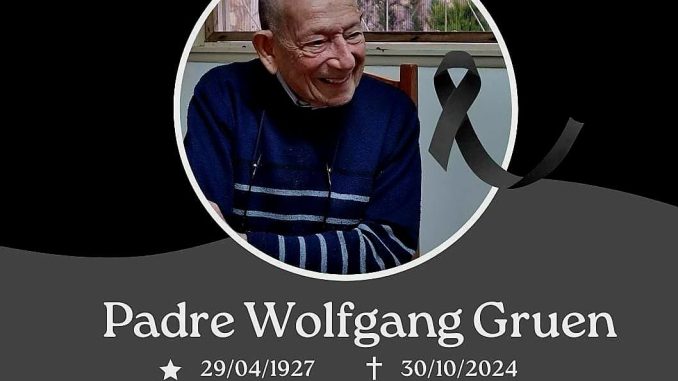
AT THE AGE OF 97 FATHER WOLFGANG GRUEN, SDB, DIED
ONE OF THE GREATEST NAMES OF BIBLICAL-CATECHETICAL REFLECTION IN BRAZIL
The Inspectorate of Saint John Bosco announced the death of Fr. Wolfgang Gruen, SDB, on Wednesday, October 30, in Belo Horizonte (Minas Gerais – Brazil), at the age of 97, of which 80 years as a Salesian of Don Bosco and almost 71 years as a priest.
The Episcopal Commission for Biblical-Catechetical Animation of the National Conference of Bishops of Brazil (CNBB) expressed gratitude for the donation of Fr. Gruen, for his life dedicated to teaching Theology, Biblical Studies and Religious Education, with exceptional methods and approaches, which has formed countless people throughout Brazil.
“His biblical-catechetical reflection has contributed to giving important orientations to Brazilian pastoral care. In addition to having trained great names who are now active in this field of pastoral care and theological reflection, Father Gruen contributed directly to the milestones of the document Renewed Catechesis (1983) and the National Directory of Catechesis (2006),” said the members of the Biblical-Catechetical Commission of the CNBB.
The Commission also emphasized that the memory of Father Gruen “makes us praise God for the prophetic testimony of a man who knew how to read the Word of God in Scripture and in the signs of the times, translated his greatness into the simple language of our people, understood the indications that the Spirit inspired and embodied the experience of the encounter with the eternal Word of God in a simple life, of constant encounters with the littlest of this world”.
The testimony of Father Gruen encourages everyone to walk creatively, listening to what the Lord inspires through the memory of those who have preceded us, their choices and their authentic way of understanding and living the faith.
“We raise our prayers so that, before the Lord, Fr. Gruen may intercede for the catechists of all Brazil, so that their missionary discipleship of the Word may mark our time as the ministry of Fr. Wolfgang Gruen has marked an entire generation in our country.”
Biography and ecclesial itinerary
Father Wolfgang Gruen, SDB, was born on April 29, 1927 in Niederfinow, Brandenburg, Germany, to Erich Gruen and Herta Gruem, a Catholic family with Jewish roots. During his childhood, the rise of Hitler and anti-Semitic and totalitarian policies forced the family to seek refuge in other countries.
They initially moved to Italy, but after observing the alliance between Hitler and Mussolini, his father chose to move the family to England, giving priority to religious freedom. During his stay in England, Wolfgang began his journey in the Salesian Congregation, entering the aspirantate in London in 1938.
In 1940, after obtaining authorization, the family emigrated to Brazil, where they settled permanently. In Brazil he made his first religious profession on January 31, 1944 in Pindamonhangaba (São Paulo).
Between 1944 and 1949 he studied Philosophy at the Salesian Institute of Pedagogy and Philosophy of Lorena (São Paulo) and, between 1950 and 1953, he completed his studies at the Pio XI Theological Institute of São Paulo, where he deepened his interest in religious education and the human sciences.
He was ordained a priest on December 8, 1953 in São Paulo. In addition to his religious formation, Father Gruen obtained an Ordinary Licentiate in Anglo-Germanic Letters (1969-1972).
In 2006 he received an honorary doctorate in Theology and Biblical Sciences from the Pontifical Salesian University of Rome (UPS), in recognition of his contribution to religious education and biblical studies.
Throughout his life, Father Gruen built a notable academic career. He was a professor of the first degree course in Religious Sciences in Brazil, introduced in the 1970s, at the Federal University of Juiz de Fora (UFJF).
His innovative approach to religious education, detached from catechesis, became a milestone. Influenced by thinkers such as Hugo Assmann, Paulo Freire, Hubertus Halbfas, Paul Tillich and other theologians, he proposed a model of religious education with an anthropological focus, which gave centrality to the human search for meaning and distanced itself from a strictly confessional perspective.
This proposal, aimed at basic public education, brought an open and critical vision, which considered the needs of a plural and secular society. In addition to his career in higher education, Fr. Gruen played a relevant role in the State Council of Education of Minas Gerais, where he contributed to the state regulation of religious education.
His work broadened the understanding of religious education, in the sense of offering, in his words, “an opening to cultural and religious diversity”.
Author of several works, one of his best-known publications is The Time That Is Called Today, in which he condenses the Old Testament into accessible and profound language. The book, intended for group study, catechesis and personal use, invites the reader to “enter into the spirit of the Old Testament”, providing diagrams, maps and ideas for revision. Certainly, Fr. Gruen was part of the “second generation” of Salesians: those who, although not knowing Don Bosco, lived with the Salesians of the first generation, who in turn had direct contact with the holy founder.
He always fondly remembered figures such as Fr. Eneias Tozzi, a former student of Don Bosco and his first inspector at the Salesian College in London, and Fr. Federico Gioia, with whom he confessed weekly at the Santa Rosa school in Niterói (Rio de Janeiro).
Don Gruen will always be remembered for his consistency in preferring the poorest, having dedicated himself pastorally to the spiritual care and help to the cry of the little ones of the Kingdom. In fact, his trajectory, marked by the desire to educate and the incessant search for understanding religions, has left a lasting legacy in religious education and the science of religion, promoting a vision that still inspires educators and scholars in Brazil and abroad.
(traduzione in italiano di Paulo Stippe Schmitt)










